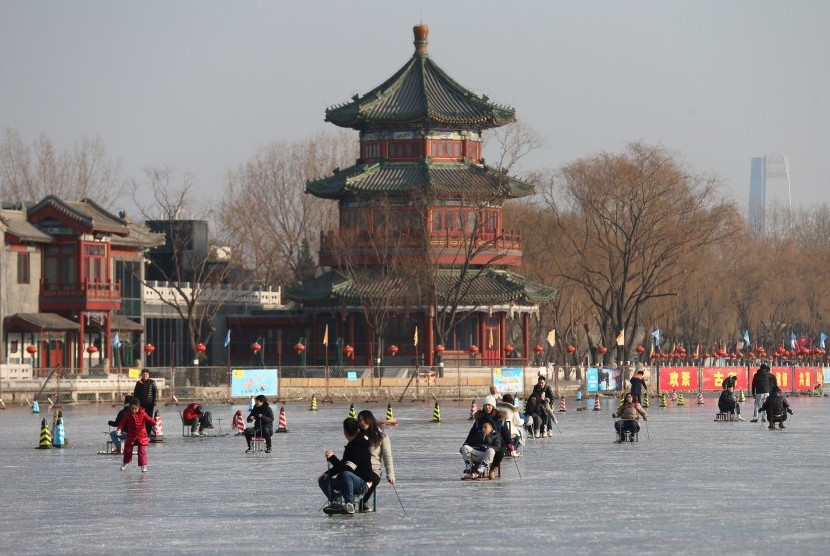REPUBLIKA.CO.ID, BEIJING -- Xia Xiaokang and Bruno Chen, who both run private-sector companies, are the sort of businessmen that Chinese leaders are increasingly concerned about as economic growth slows.
Beijing is counting on the private sector to invest more in the economy and take up the slack as the government tries to engineer a shift away from largely state-run heavy industry to more entrepreneurial and services-led growth.
Unfortunately, just when China needs the private sector to step up, they look to be stepping back.
"We plan to downsize our business rather than expand," said Chen, who runs Ningbo Tengsheng Garments Co in the coastal export hub of Zhejiang province in eastern China.
"We cannot feel any improvement in the economy," he said.
Xia, general manager of Wenzhou Kingsdom Sanitary Ware Co some 400 km (250 miles) from Shanghai, similarly lacks confidence in the economy.
"We have hardly made any fixed-asset investment since last year and we now plan to rent out part of our factory building because it's too big," he said.
After March data suggested that economic activity was finally picking up after a long slowdown, April figures released at the weekend suggested otherwise. Overall investment, factory output and retail sales all grew more slowly than expected.
Private-sector investment for January to April grew just 5.2 percent, its weakest pace since the National Bureau of Statistics (NBS) started recording the data in 2012. More worrying, private-sector investment is decelerating sharply from rates near 25 percent in 2013, to just 10 percent last year and now just over 5 percent.
The reason policymakers are so concerned is that private-sector fixed-asset investment, which includes land, equipment and buildings, accounted for more than 60 percent of overall investment in January to April. The sector provides a third of all jobs in China and creates 90 percent of new urban jobs, state media have reported.
"Because the total amount of private investment is relatively large, its continued slowdown could restrain stable growth, and requires a high degree of attention," the NBS said on Saturday after it released the latest economic data.
The private sector is key to China's economic future, economists say.
Big Chinese state-owned enterprises (SOEs) hog bank loans and hold most of the country's fixed assets, but economists say the swarm of mid-sized private companies are the primary source of investment, innovation and productivity growth.
They are crucial for Beijing because such firms are seen as more efficient users of capital, in sharp contrast with the inefficient state-owned sector.
"Weak private investment is a fundamental problem," said a researcher at the National Development and Reform Commission, the top planning agency. He declined to be identified as he was not authorized to speak publicly to the media.
"We still need to unleash vitality of enterprises and manufacturers to help stabilize the economy."
Private surveys show downward pressure on wages as factories shed workers.
Chen said his company, with a workforce of 160, exports mostly to Europe. China's textiles industry has been hard hit by slackening global demand, which has not been offset by rising domestic demand.
Xia said his clients in Russia and Venezuela have been impacted by falls in their local currencies and conflict in parts of the Middle East have left his customers in that region very cautious. Europe is steady and he was optimistic about Southeast Asia, he said.
"Interest rates are low, but investment is declining, which shows that the overall market - domestic and overseas market - is not good," he said.
Government efforts since last year to stimulate the economy have been designed to cushion slowing growth and limit unemployment. Economists said the efforts naturally targeted the public sector, but they have done little to resolve the challenges facing private Chinese firms, in particular weakness in manufacturing, where much of the private sector's pain is concentrated.
Indeed, state-sector fixed-asset investment in January to April rose 23.7 percent from a year earlier.
"Government spending is targeting sectors that advantage SOEs," said Tim Condon, economist at ING in Singapore. "So there's less insulating, less boosting to the private sector in the face of what are pretty stiff shocks."
While investment has been flowing into services and out of manufacturing, much of the most valuable parts of the services sector - telecommunications for example, or healthcare - are either protected or heavily regulated in favor of state-linked companies.
At the same time weak global demand has taken a particular toll on private Chinese firms.
In 2016, for example, most of the export categories have declined in volume and value year to date compared with the first four months of 2015. Export volumes of ceramics, shoes, jewelry, bags, fertilisers, even Chinese medicine are all down.
The government has been encouraging private investment in infrastructure projects, but some critics complain the government is using the initiative as an excuse to foist weak assets off on private investors, offering poor returns and little protection against risk.
"(Private firms) cannot find profitable projects, and they are not confident about the future," said Zhu Baoliang, chief economist at State Information Centre, a top government think-tank.
China's cabinet this month promised "strong measures" to halt slowing private-sector investment, including relaxing market access for private firms.
The China Banking Regulatory Commission followed up with an urgent notice to commercial banks to clear bottlenecks slowing lending to private firms, sources with direct knowledge told Reuters.
More broadly, China's corporate sector is feeling the strain of the slowdown. A Reuters analysis showed Chinese companies are facing their tightest liquidity crunch in a decade.
Reflecting those strains, Xia said his company stopped raising wages in 2015 and started laying workers off in the second half of that year.
"We are currently very confused, there is no direction. We'll be lucky if we can sustain our business."


